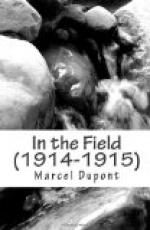I directed my attention more particularly towards Jaulgonne, because it was in that direction that the attempt to cross the river would be made. The heights immediately above Jaulgonne rise steeply on the north bank, and almost stand in the river. On the other hand, to the south, on our side, the left bank of the Marne is bordered by extensive meadows crossed by the railway and the high-road to Epernay. The position therefore would have been very strong for the Germans, if they had crossed to the other side of the river, for we should have been obliged, before we could reach the bridge, to traverse a vast open expanse which they could have kept under the fire of their artillery. My Chasseurs, prompt to grasp the reason of things, scrutinised the opposite bank no less intently than I. No movement could be seen; nothing suggested the presence of troops among the russet thickets which covered the sides of the silent hill. Could they have already retired farther off? Could they have abandoned this formidable position without any attempt to defend it?
At that moment one of my Chasseurs appeared, coming by the steep path which led from the road to the wooded ridge on which we were. His horse was panting, for the declivity was stiff, and he had had to hasten. He brought me orders.
“Mon Lieutenant, the Captain has sent me to tell you to join him as quickly as possible at the other end of the bridge. The first troop has already crossed, but some of the enemy’s horse have been seen on the other side of the village.”
As he said these words we heard some firing in the distance, which sounded very distinct and sharp in the radiant peace of that beautiful September morning. “Come, so much the better,” thought I. “We have engaged them. We shall have a good time.” My men had already begun to joke and to be more alert and abrupt in their movements. It was a kind of joyous reaction which always affects troopers when they begin to hear the guns and look forward to a good hard ride in which they, like the rest of us, are always certain of getting the best of it.
In single file we went quickly down towards the plain by the stony, slippery path. We soon reached the high-road, and then turned to the left and came upon the long causeway bordered by poplars which led to the bridge. Quite close to the bank I saw a small group of dismounted cavalrymen, and soon recognised our Colonel with his Brigade Staff. He was giving his orders to the Lieutenant-Colonel commanding the Chasseurs d’Afrique. I went up to him to report, and learnt that the first squadron had already crossed the river and occupied the village on the other side. Some parties of German cavalry had been seen on the neighbouring heights.
I got ready to rejoin my comrades at once. But patience was required if the Marne was to be crossed. The bridge appeared to be a delicate sort of toy hovering over the water. How could they dream of sending thousands of men, horses, and guns over a thing so slender that it looked as though it were supported by the fragile meshes of a spider’s web? Captain D. gave me the Colonel’s precise orders: not to pass more than four troopers at a time, and these at walking pace.




